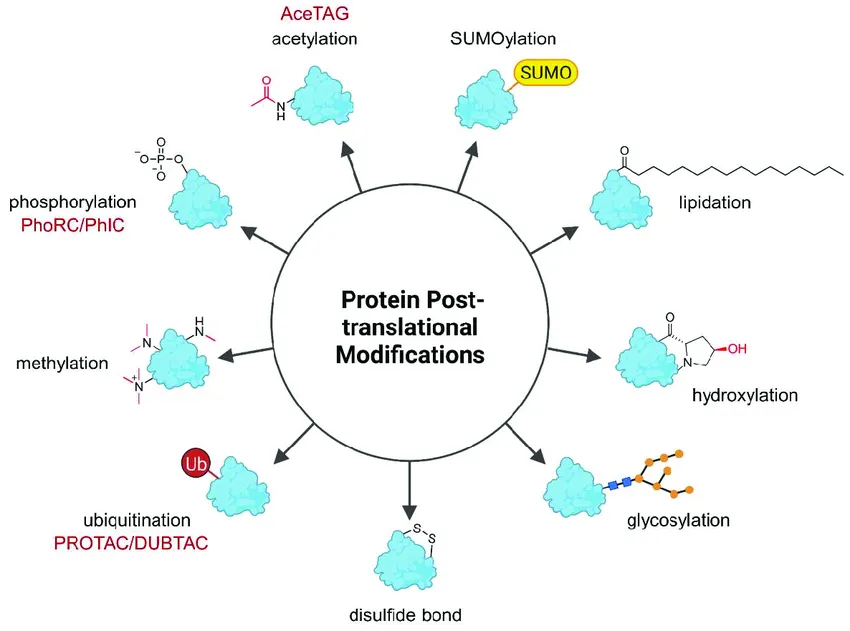Meta-PTMomics Analysis Service
Based on high-resolution mass spectrometry platforms and protein microarray technology, MtoZ Biolabs has launched the meta-PTMomics analysis service which enables systematic detection and comprehensive analysis of multiple protein post-translational modifications (PTMs). This service covers a variety of modifications, including phosphorylation, acetylation, methylation, glycosylation, and ubiquitination. Through optimized experimental workflows and bioinformatics analysis, it can accurately identify modification types and sites, capture abundance changes, and provide functional annotation. The final output data include global modification profiles, quantitative results, and biological interpretation, helping researchers fully understand the roles of different modifications in cellular function, signaling regulation, and potential biomarker discovery.
Overview
Meta-PTMomics refers to the systematic study of the overall landscape of protein post-translational modifications (PTMs) in biological systems. Unlike traditional analyses that focus only on a single modification type, it can depict a comprehensive modification profile under specific cellular environments and reveal the interactions and dynamic changes among modifications. Relying on mass spectrometry and bioinformatics methods, this study can obtain modification distribution, abundance, and functional annotation. Meta-PTMomics has been widely applied in signal regulation, epigenetics research, protein network construction, and biomarker screening, providing a global perspective and reliable data support for understanding the complex regulatory mechanisms of life processes.

Heitel, P. Molecules, 2023.
Figure 1. Overview of the Most Common Post-Translational Protein Modifications (PTMs).
Analysis Workflow
1. Sample Preparation and Digestion
Proteins are extracted and pretreated from experimental samples, followed by enzymatic digestion under optimized conditions.
2. Peptide Enrichment
Specific enrichment strategies are applied to selectively capture different types of modified peptides.
3. Mass Spectrometry and Protein Microarray
High-resolution mass spectrometry platforms combined with protein microarray technology are used to achieve systematic identification and quantification of multiple types of modifications.
4. Data Analysis
Database searches and bioinformatics tools are applied to output modification site distribution, abundance changes, and functional annotation, generating a comprehensive modification profile.
Sample Submission Suggestions
1. Sample Types
A wide range of samples is accepted, including cells, tissues, serum/plasma, body fluids, and purified proteins. Sources must be clearly identified and meet experimental requirements.
2. Sample Quality
Samples should avoid repeated freeze-thaw cycles to maintain protein integrity and modification stability. Storage at -80℃ is recommended.
3. Sample Transportation
Dry ice shipping is recommended to ensure samples remain at low temperatures during transportation and to prevent modification loss.
Note: For special samples or if detailed submission guidelines are required, please contact MtoZ Biolabs technical staff.
Service Advantages
1. Comprehensive Analysis
Capable of covering multiple types of post-translational modifications simultaneously, providing an overall modification profile.
2. High Sensitivity and Accuracy
Utilizes advanced mass spectrometry and protein microarray technology to accurately detect low-abundance modification sites.
3. One-Stop Service
From experimental design and detection to data analysis, systematic support is provided throughout the entire process.
4. Flexible Customized Solutions
Experimental strategies are adjusted based on research objectives and sample characteristics to meet diverse needs.
Applications
1. Multi-Modification Synergy Research
By simultaneously analyzing the interaction effects of different types of post-translational modifications, the comprehensive regulatory mechanisms can be revealed.
2. Dynamic Process Monitoring
Meta-PTMomics analysis service can be used to track changes in the overall modification profile of cells during development, differentiation, or under environmental stimuli.
3. System-Level Integration
Combining PTM information with transcriptomics, metabolomics, and other omics data provides a multi-layered regulatory perspective.
4. Functional Mechanism Analysis
Meta-PTMomics analysis service can help explore regulatory patterns and biological functions of specific proteins or pathways.
FAQ
Q1: What Is the Difference between Meta-PTMomics and Traditional Single PTM Analysis?
A1: Meta-PTMomics emphasizes a holistic perspective, enabling the simultaneous detection and analysis of multiple post-translational modifications (such as phosphorylation, acetylation, methylation, and glycosylation), revealing their synergistic effects and dynamic regulatory relationships, whereas traditional analysis often focuses only on a single modification type.
Q2: Can Multiple Omics Datasets Be Integrated for Joint Analysis?
A2: Yes. Meta-PTMomics can be combined with transcriptomic, metabolomic, and other datasets to help construct cross-level regulatory networks and obtain a systematic perspective.
Q3: Are the Results Reproducible and Comparable?
A3: Standardized experimental workflows and strict quality control ensure that results remain highly consistent across technical and biological replicates, making them suitable for sample comparisons.







